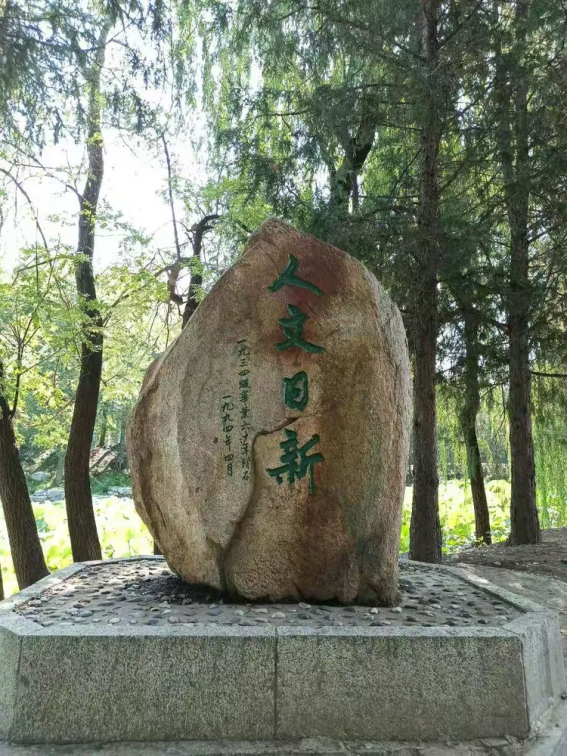编者按:
“我们对自由的质疑,源于科学早期与权威的抗争。那是一场深刻而激烈的斗争:它允许我们提问——怀疑——不必确信。我认为,铭记这场斗争至关重要,否则我们可能失去已取得的成果。这亦是对社会的一份责任。”
——理查德·费曼,《科学的价值》
科学与人文交相辉映,共同照亮人类文明之路。本周“人文日新”融汇古今智慧,从费曼强调科学的价值不仅在于赋予我们质疑一切的勇气,更在于唤醒我们对人类命运的责任;到阿西莫夫指出艺术与科学实为一体;从梭罗在瓦尔登湖畔追问“我们为何如此匆忙地奔向成功的绝望”,到毛泽东以“雄关漫道真如铁,而今迈步从头越”展现革命者面对艰险的豪迈气概……科学与人文从来不是彼此割裂的孤岛,而是我们理解世界、塑造未来的共同根基,奏响理性与情感交融的深邃交响。
本周领读:张成萍
一、《科学的价值》
“我们对自由的质疑,源于科学早期与权威的抗争。那是一场深刻而激烈的斗争:它允许我们提问——怀疑——不必确信。我认为,铭记这场斗争至关重要,否则我们可能失去已取得的成果。这亦是对社会的一份责任。”
——理查德·费曼,《科学的价值》(1955年秋于美国国家科学院公开演讲)
英文原文:
“Our freedom to doubt was born out of a struggle against authority in the early days of science. It was a very deep and strong struggle: permit us to question – to doubt – to not be sure. I think that it is important that we do not forget this struggle and thus perhaps lose what we have gained. Herein lies a responsibility to society.”
—Richard Feynman, The Value of Science (1955 lecture)
二、《不羁的思绪》
“人们常将艺术与科学描绘成互不相干的两极……这大错特错。真正的艺术家既想象丰富又深谙理性,他对自己的创作了然于心;否则,其艺术难臻佳境。真正的科学家同样深谙理性且想象丰富,他有时凭直觉便跃至答案,理性只能紧追慢赶;否则,其科学进展必缓。”
——艾萨克·阿西莫夫,《不羁的思绪》(1983年,第25章《科学与艺术》)
英文原文:
“How often people speak of art and science as though they were two entirely different things, with no interconnection…That is all wrong. The true artist is quite rational as well as imaginative and knows what he is doing; if he does not, his art suffers. The true scientist is quite imaginative as well as rational, and sometimes leaps to solutions where reason can follow only slowly; if he does not, his science suffers.”
—Isaac Asimov, The Roving Mind (1983)
三、《瓦尔登湖》
“我步入森林,是因为我希望生活得清醒,只面对生命最本质的事实,看看我能否学到它要传授的真理,免得临终时才发现自己从未真正活过。我不想过那种不是生活的生活,因为生命是如此宝贵;我也不想听天由命,除非万不得已。我要深入地体验生活,吸取它的全部精髓,过坚毅如斯巴达式的生活,击溃一切非生命本质之物,大刀阔斧、细细剥离,将生活逼至角落,还原其至简本质。”
——亨利·戴维·梭罗《瓦尔登湖》(1854年·第二章《我生活的地方,我生活的目的》)
英文原文:
I went to the woods because I wished to live deliberately, to front only the essential facts of life, and see if I could not learn what it had to teach, and not, when I came to die, discover that I had not lived. I did not wish to live what was not life, living is so dear; nor did I wish to practise resignation, unless it was quite necessary. I wanted to live deep and suck out all the marrow of life, to live so sturdily and Spartan-like as to put to rout all that was not life, to cut a broad swath and shave close, to drive life into a corner, and reduce it to its lowest terms…
—Walden, Chapter 2 “Where I Lived, and What I Lived For”
四、《忆秦娥·娄山关》
忆秦娥·娄山关 (一九三五年二月)
毛泽东
西风烈,
长空雁叫霜晨月。
霜晨月,
马蹄声碎,
喇叭声咽。
雄关漫道真如铁,
而今迈步从头越。
从头越,
苍山如海,
残阳如血。
英文译文(译者:许渊冲):
The Pass of Mount Lou
Mao Zedong
The wild west wind blows strong;
The morning moon shivers at the wild geese's song.
On frosty morn
Steeds trot with hooves outworn
And bugles blow forlorn.
Fear not the strong pass iron-clad on all sides!
The summit's now surmounted with big strides.
Surmounted with big strides,
Green mountains like the tide;
The sunken sun blood-dyed.
五、《台风》
这是一种可怕而迅速的东西,就像一个盛满愤怒的瓶子突然被打碎了一样。它似乎在船周围爆炸了,同时伴随着强烈的震动和汹涌的巨浪,就像一个巨大的堤坝被吹向了风中。顷刻间,人们彼此失去了联系。这就是狂风的瓦解力量:它将人们与同类隔离开来。地震、山崩、雪崩,都是如此,在猝不及防间完全击垮人类——完全没有怜悯之心。一阵狂风的袭击就像仇人一样,抓住一个人的四肢,抓住他的思想,试图把他的精神都打垮。
——约瑟夫·康拉德,《台风》(1902年,第3章,李展译)
英文原文:
It was something formidable and swift, like the sudden smashing of a vial of wrath. It seemed to explode all round the ship with an overpowering concussion and a rush of great waters, as if an immense dam had been blown up to windward. In an instant the men lost touch of each other. This is the disintegrating power of a great wind: it isolates one from one's kind. An earthquake, a landslip, an avalanche, overtake a man incidentally, as it were—without passion. A furious gale attacks him like a personal enemy, tries to grasp his limbs, fastens upon his mind, seeks to rout his very spirit out of him.
六、《师说》
古之学者必有师。师者,所以传道受业解惑也。人非生而知之者,孰能无惑?惑而不从师,其为惑也,终不解矣。生乎吾前,其闻道也固先乎吾,吾从而师之;生乎吾后,其闻道也亦先乎吾,吾从而师之。吾师道也,夫庸知其年之先后生于吾乎?是故无贵无贱,无长无少,道之所存,师之所存也。
——韩愈,《师说》(唐·贞元十八年,802年)
英文译文:
In ancient times those who wanted to learn would seek out a teacher, one who could propagate the doctrine, impart professional knowledge, and resolve doubts. Since no one is born omniscient, who can claim to have no doubts? If one has doubts and is not willing to learn from a teacher, his doubts will never be resolved. Anyone who was born before me and learned the doctrine before me is my teacher. Anyone who was born after me and learned the doctrine before me is also my teacher. Since what I desire to learn is the doctrine, why should I care whether he was born before or after me? Therefore, it does not matter whether a person is high or low in position, young or old in age. Where there is the doctrine, there is my teacher.
——Han Yu, On the Teacher (802 CE)
(译文参考自:中国日报网(2018-09-10),译者:译国译民)
七、《漫步者》
我们明知某些事无法永远逃避,却仍放任自己拖延——这种愚蠢,是普世通病之一。尽管道德家谆谆教导,理性也屡屡告诫,它仍在每个人心中普遍存在,即便深浅程度不同;哪怕是最坚定地抵抗它的人也会发现,拖延即便不是最强烈的欲望,也一定是最顽固的那一种:它不断卷土重来,虽屡遭挫败,却从未被彻底消灭。
——塞缪尔·约翰逊,《漫步者》第134篇(1751年)
英文原文:
The folly of allowing ourselves to delay what we know cannot be finally escaped is one of the general weaknesses which, in spite of the instruction of moralists, and the remonstrances of reason, prevail to a greater or lesser degree in every mind; even they who most steadily withstand it find it, if not the most violent, the most pertinacious of their passions, always renewing its attacks, and, though often vanquished, never destroyed.
——Samuel Johnson, The Rambler No. 134 (1751)
八、《毛姆的书单》
小说家总摆脱不了自身的偏见。他所选择的题材、他所创造的人物,以及他对这些人物的态度无一不被其偏见所制约。他笔下的一切都是他个性的流露,是他的内在天性、感受以及经历的表现。无论他如何竭力保持客观,他终究是自身独特癖好的奴隶。无论他如何竭力秉持公正,他都会有所偏向,这就好比是灌了铅的骰子一样。在小说开篇,他就在诱导你注意某个人物,并对该人物产生兴趣及共鸣。……小说家必须编排自己的素材,以捕获并牢牢抓住读者。在必要时,小说家会牺牲真实性和可靠性来达到这一效果。
——威廉·萨默塞特·毛姆,《毛姆的书单》(李亚飞译,译文略有改动)
英文原文:
The novelist is at the mercy of his bias. The subjects he chooses, the characters he invents and his attitude towards them, are conditioned by it. Whatever he writes is the expression of his personality and it is the manifestation of his innate instincts, his feelings and his experience. However hard he tries to be objective, he remains the slave of his idiosyncrasies. However hard he tries to be impartial, he cannot help taking sides. He loads his dice. By the mere fact of introducing a character to your notice early in his novel, he enlists your interest and your sympathy in that character. ...he must arrange his facts in such a manner as to capture and hold your attention. So, if need be, he will sacrifice verisimilitude and credibility to the effect he wants to get.
——W. Somerset Maugham, The Art of Fiction: An Introduction to Ten Novels and Their Authors (Chapter 1)
【栏目寄语】
“人文日新”,源自清华百年精神内核,意指人文精神的传承与革新。
“人文日新”栏目,愿以每日晨读为微光,与您共燃思想星火。
“人文日新”不止于晨读,更是对永恒命题的求索。

“人文日新”碑,由清华1934级校友于毕业60周年之际(1994年)敬赠母校,并于校庆83周年纪念日隆重落成。碑上镌刻的“人文日新”四字,正是清华校园文化与精神的核心象征。
1934级堪称清华校史上群星璀璨的一届。这方纪念碑的捐赠者们,有许多如雷贯耳的名字:季羡林、夏鼐、吴晗、翁文波、张宗燧、孙德和、时钧、高振衡、徐芝纶、张青莲、陈省身、张光斗、赵九章、钱学森、顾功叙、张煦……他们以人文之思、科学之光、工程之智,共同诠释了“日新”的真谛——在传承中突破,在坚守中新生。
“人文日新”栏目由清华大学深圳国际研究生院人文社会科学部主办,自2025年9月启动,以每日经典晨读,启迪智慧,滋养心灵。更多精彩内容将每日通过“SIGS艺术与人文”微信公众号发布,欢迎广大读者踊跃投稿。
供稿:人文社会科学部
统筹:张成萍、陈芷洹
编辑:叶思佳








